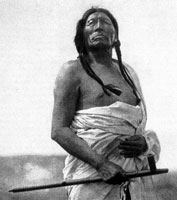
The WAY of the
|
 |
||||
What does the word ‘shaman’ conjure up within our imagination? A semi naked person dancing around a fire, shaking rattles at the body of a sick person, perhaps? Or a mystic meditating in some remote cave in Tibet? Or even more fantastic, an Amazon man or woman shape-shifting into a cougar or an eagle to run through the jungle or soar incredibly high over its vast expanse? None of these images is incorrect, they all hold seeds of truth, even if they are somewhat romanticised or stereotyped. The way this is actually achieved within different cultural and ethnic groups may look so wildly different as to bear hardly any resemblance to each another. And yet what matters here are not the tools or the techniques involved, but the outcome. THE TRADITIONAL ROLEIn virtually all tribal settings the shaman’s role is often a highly valued and respected one. It is the shaman who dares to travel into the often terrifying world of the Spirits to uncover the hidden cause behind any problems experienced by individuals or the tribal community as a whole. Droughts, diseases, poor harvests or a poor hunt usually happen for a reason, and it is the shaman’s task to find out the cause and provide the solution that will bring healing and restore the world to balance. Shamanism is not a religion. Although it is more prevalent in so called animistic (the belief that everything, whether animate or not, has a soul) cultures, it is also found in other religious settings. There are Muslim, Hindu, Buddhist and even Christian shamans. The point I am trying to make here is that there is no inevitable conflict between mainstream religion and shamanism, in fact one could even say that most of the world’s great religious mystics and visionaries were themselves none other than shamans who received their visions, their knowledge and their gifts through shamanic trance. Which brings us to the question of how one becomes a shaman in the first place. Sometimes the ‘gift’ is inherited, as if a shamanic ‘gene’ is passed on. At other times it comes through an apprenticeship to an existing shaman that culminates in an initiation, a rite of passage where power is transferred from the master to the apprentice. But perhaps the most common way is when one is ‘chosen’ by Spirit, by life itself. In these cases a dramatic and often traumatic event derails one from one’s normal life. Sometimes a prolonged illness or a personal catastrophe opens up one’s ‘inner door’ to the spirit world. When this happens the affected person can no longer close the door and simply return to their previous life, eventually they must find ways of incorporating the new gift into their lives and share their gift or vision with others. THE CONTEMPORARY ROLEUndeniably the world has changed. So much is known and mapped out that it sometimes seems that there are no more mysteries. Certainly there seems to be no more uncharted territories or frontiers left. Tribal people too are being deeply affected by the changes that are sweeping the planet. Their lands are increasingly encroached upon, the forests and the wild places are shrinking alarmingly. And with these the sway of the tribal ways, of the old wisdom, shrinks as well. It is increasingly discarded as no longer relevant, as redundant. But is it? Half of today’s humanity live in cities, urban environments with very different challenges to those that stretched us in tribal times. Surrounded by the artificiality of a human made environment it is harder for us to remember our connection to the Earth. Crowded urban environments may only exacerbate deep feelings of separation, of isolation and alienation. Surrounded and constantly bombarded by materialistic and consumeristic messages that do not hold our spiritual interests at heart, it can be very challenging to remember the need of our spirit to stretch its wings and soar. So where are the urban shamans and what can they do for us in this day and age? They are perhaps not as easily identifiable as they once were. There is no heading for ‘shaman’ in the Yellow Pages. Telstra’s help number won’t be of any use either. The best way is to ask around in spiritual circles. A shaman cannot exist without a community to serve, so searching through the community is the way to go. And to the question of what they can do, in essence the shaman’s role has not changed that much, even though the environment has. The shaman’s time-honoured role of healing and restoring balance is still valid, still applies. Are our lives any more balanced now than, say, ten thousand years ago? I dare say not. We need just as much healing now as then, if not more. We need even more so to be re-connected with the greater cycles of life, with the vast mirror of the natural world, to Earth Mother and Sky Father. We need to re-establish balance between the inner God and Goddess. We need to be reconnected to the greater picture, to what truly matters and not to yet more ephemeral and meaningless nonsense. We need to ask the truly important questions: Who am I, again? Why did I come here? What am I here to do? Am I doing it? These and all the other questions that need answering. A shaman with integrity can help us achieve this by creating a Sacred Space, a magical ring of such power that we can once again speak with our God/Goddess and find out what we need to know, where to go from here as we travel on our great Journey Home.
|
|||||